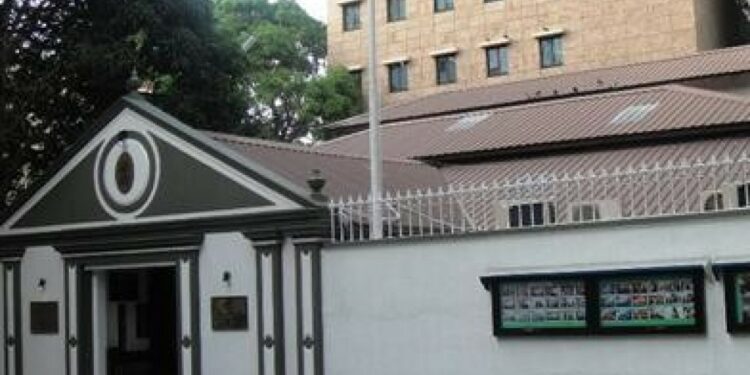
Indian Embassy in Male, Maldives
Male, July 5: (Agencies): Police have arrested a man for threatening to bomb the Indian High Commission in Male’. The suspect, identified as a 42-year-old Maldivian male, was arrested under court order on Saturday night.
The arrest comes amid heightened security at the Indian High Commission and the Chinese Embassy following threats on social media to bomb the Indian High Commission and demonstrate in front of the Chinese Embassy.
The threat to bomb the Indian High Commission is under investigation by the Serious and Organized Crime Department.
In a statement announcing the arrest, police warned that incitement to violence and destruction of property are criminal offenses, and will be investigated and taken action against.
Police also expressed concern some online media outlets were disseminating information in a manner that defends and encourages threats to security of foreign diplomatic missions and disrupts diplomatic relations.
“Given that this is a sensitive issue that puts foreign ambassadors and employees of foreign missions in Maldives at risk, and has the potential to disrupt diplomatic relations, we urge all parties to be more responsible in disseminating information. Furthermore, Maldives Police Service instructs all parties not to engage in any act which may compromise the safety and security of diplomatic missions of foreign countries stationed in Maldives,” said the police.
New Delhi July 1: India’s high commission in Malé has asked the Maldivian government to take steps to protect the high commissioner and diplomatic personnel from “malicious” and “personal” articles in the local media.
A note verbale from the Indian high commission to the Maldivian foreign ministry, dated June 24, was published in the Maldivian media on Wednesday.
In the letter, whose authenticity has been confirmed by The Wire, India complained about “recurring articles and social media posts attacking the dignity of the High Commission, the Head of the Mission, and members of the diplomatic staff by certain sections of the local media”.
“These attacks are motivated, malicious and increasingly personal,” wrote the Indian high commission.
It requested the Maldivian government to ensure the protection of India’s diplomats to “prevent any attack on his/their person, freedom and dignity, and prevent any disturbances to the peace of the Mission or impairment of its dignity in accordance with relevant articles of the Vienna Convention on Diplomatic Relations (1961)”.
Besides, the high commission also called for action “in accordance with International Law and Maldivian Law, against the perpetrators for these gross violations of the Vienna Convention”.
The diplomatic missive further noted that the repeated attacks through the articles and social media posts are “attempts to incite hatred and violence against India, the High Commission and members of its diplomatic staff”.
Quoting from the Vienna convention, the letter referred to Article 29 which stated that the receiving state will treat a diplomatic personal with “due respect and shall take all appropriate steps to prevent any attack on his person, freedom or dignity”.
It also referred to the preamble of the Vienna convention which stated that the purpose of these privileges “was not to benefit individuals but to ensure the efficient performance of the functions of diplomatic missions as representing States”.
The letter argued that the “repeated attacks on the dignity” of India’s diplomatic staff can impact the “efficient performance of the functions” of the high commission.
Asserting that the specified articles were harmful, the high commission told the foreign ministry that these could “damage the time-tested and mutually beneficial bilateral relations between India and the Maldives”.
With relations between India and Maldives having improved under Ibrahim Solih government, the opposition has criticised any India-related projects and developments as a way to attack the ruling party. The opposition has also begun an ‘India Out” campaign over alleged Indian military presence from last year, which had led to reports of rising anti-Indian sentiment in the strategic Indian ocean archipelago nation.
